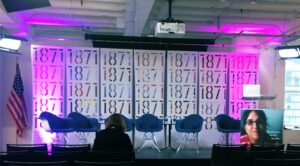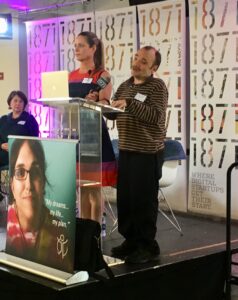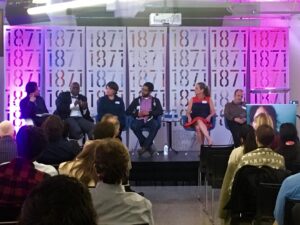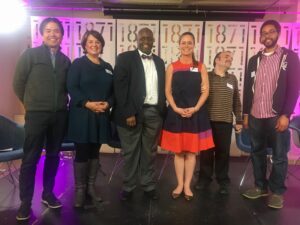 Last Thursday, Center for Independent Futures hosted an educational and engaging panel event at 1871 focusing on inclusive technology in Chicago. When developing our online learning management system, My Full Life, Independent Futures chose to focus on creating inclusive technology that would support adults with disabilities. In the last year, our consultants have met other technology professionals doing similar work. We were honored to bring these experts together for a conversation bringing accessibility and inclusion to the technology field.
Last Thursday, Center for Independent Futures hosted an educational and engaging panel event at 1871 focusing on inclusive technology in Chicago. When developing our online learning management system, My Full Life, Independent Futures chose to focus on creating inclusive technology that would support adults with disabilities. In the last year, our consultants have met other technology professionals doing similar work. We were honored to bring these experts together for a conversation bringing accessibility and inclusion to the technology field.
Inclusive Technology in Chicago: What’s Next
 One of our community members, Jake, kickstarted the event by explaining how technology helps him in his daily life. Using screen readers, Jake is able to navigate the world and stay informed. His phone and computer both support him in living his full life. In fact, Jake used a screen reader to introduce our moderator, Roger Liew of Impact Engine.
One of our community members, Jake, kickstarted the event by explaining how technology helps him in his daily life. Using screen readers, Jake is able to navigate the world and stay informed. His phone and computer both support him in living his full life. In fact, Jake used a screen reader to introduce our moderator, Roger Liew of Impact Engine.
Throughout the discussion, Liew asked important questions of our panelists about the future of technology and accessibility. Richard Brown (Infinitec/UCP Seguin), Cameron Kempson (SimplyHome), Chrissy Dale (My Full Life), and Marcelo Worsley (Northwestern University) broke down exactly why they think inclusion is the next forefront of technological innovation.
At Northwestern University, Marcelo researches how to build accessibility  into the design process for developers. He noted, “Accessibility at big companies tends to start with compliance, but it has to move forward.” Cameron agreed, but she says even that isn’t enough. “People should start to look beyond big tech to companies like these that are developing with accessibility and inclusion in mind.”
into the design process for developers. He noted, “Accessibility at big companies tends to start with compliance, but it has to move forward.” Cameron agreed, but she says even that isn’t enough. “People should start to look beyond big tech to companies like these that are developing with accessibility and inclusion in mind.”
As businesses start to realize what a large market people with disabilities and their families are, they will figure out that accessible technology is just good business. Moving beyond compliance with the ADA is the next step for companies designing tech solutions.
Designing For All: Focusing on the Individual
Part of person-centered planning centers the concept “dignity of risk.” That means that each individual is afforded the ability to try new things and encounter the risks that comes along with new experiences. At 1871, Chrissy explained that legislative changes and technological advancements helped us spread My Full Life throughout the country. “Starting with asking someone about their hopes and dreams, My Full Life allows individuals with disabilities to learn independent living skills and branch out on their own.”
 Richard expanded on this idea, explaining the biggest barrier for some people with disabilities has simply been “the technology catching up to they want to do. With technology, they can live their best full life.”
Richard expanded on this idea, explaining the biggest barrier for some people with disabilities has simply been “the technology catching up to they want to do. With technology, they can live their best full life.”
Building Inclusive Technology, Designed For Everyone
Do you want to learn more about accessibility in tech? Reach out to us today to learn more about My Full Life and how it could benefit your community! Inclusive technology in Chicago is only a starting point. The need for technology solutions like these are widespread and growing each day.
Missed the 1871 event? We filmed the panel, so keep an eye out for the video, coming soon!
